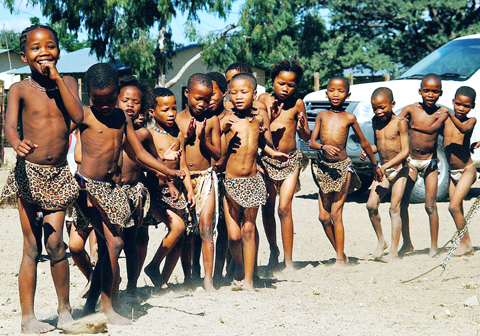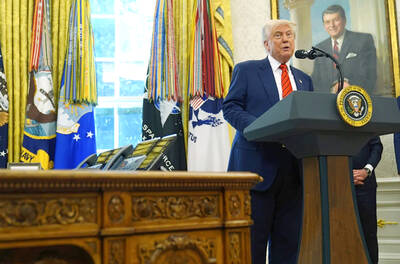Growing up in a dusty hunter-gatherer village in Botswana’s Kalahari game reserve, Bihela Sekere never even knew what a university was, much less thought of becoming a graduate.
His childhood was spent in one of Africa’s most marginalized communities, among the San Bushmen who were southern Africa’s first inhabitants but have faced centuries of exclusion and discrimination.
“It was never easy growing up as a San child, especially those who wanted to go school because the nearest school was kilometers away,” the 28-year-old said.

PHOTO: AFP
But Sekere is about to finish his master’s degree in development studies through the new Research Center for San Studies, which was launched earlier this year.
“I am happy that I can now address people as a learned San youth,” he said.
The center is housed at the University of Botswana and is meant to formalize local studies of San culture, which currently were based mainly at overseas universities.
The San have been locked in a long legal battle with the government of Botswana over their right to live in the game preserve, which the government says was a voluntary effort to turn the hunter-gatherers into settled farmers.
The relocations were needed to provide the San with schools and other public services, according to the government. Critics accused authorities of clearing the land for tourism and diamond mining projects.
Sekere was among the communities that say they were forcibly evicted from their ancestral lands, an argument that Botswana’s courts agreed with in a landmark 2006 ruling that allowed the San to return to the game reserve.
They are now locked in a new legal battle over water rights, a contentious issue for people living on the fringes of the Kalahari desert.
For Kuela Kiema, a San author who wrote about the evictions in his book Tears for my Land, the research center is somewhat a consolation for their suffering.
“At least the government has finally realized that we are part of Botswana and that we deserve better. We may still be having issues with the government but at least they have done something for our benefit,” he said.
The center’s acting director Maitseo Bolaane said the goal is to become the leading research center for San studies while helping more San youth access higher education.
Norway has funded the center’s start-up with a US$1.9 million grant, which provides scholarships to San students to study either at the University of Botswana or overseas.
“We hope to get other financiers so that we can be able to assist more San youth who wish to pursue their studies,” said Bolaane, adding that about 10 youths are already going through the program.
Few San children go to university for the simple reason that they struggle to receive decent, basic educations.
“Their environment is different because thy have to walk long kilometers to their nearest schools, a thing which negatively impacts on their performance,” she said.
About 100,000 Bushmen remain spread across Botswana, Namibia and South Africa. In all three countries they struggle to protect their ancestral lands, while coping with 21st century curses of unemployment, poverty, alcohol abuse and AIDS.
Sekere said he hoped the center would help make higher education possible for more people in his community.
“It is my wish that more San youth would benefit from this center. We have been undermined for a long time and it’s high time we started making a positive mark in this country,” Sekere said.

A new online voting system aimed at boosting turnout among the Philippines’ millions of overseas workers ahead of Monday’s mid-term elections has been marked by confusion and fears of disenfranchisement. Thousands of overseas Filipino workers have already cast their ballots in the race dominated by a bitter feud between President Ferdinand Marcos Jr and his impeached vice president, Sara Duterte. While official turnout figures are not yet publicly available, data from the Philippine Commission on Elections (COMELEC) showed that at least 134,000 of the 1.22 million registered overseas voters have signed up for the new online system, which opened on April 13. However,

ALLIES: Calling Putin his ‘old friend,’ Xi said Beijing stood alongside Russia ‘in the face of the international counter-current of unilateralism and hegemonic bullying’ Chinese President Xi Jinping (習近平) yesterday was in Moscow for a state visit ahead of the Kremlin’s grand Victory Day celebrations, as Ukraine accused Russia’s army of launching air strikes just hours into a supposed truce. More than 20 foreign leaders were in Russia to attend a vast military parade today marking 80 years since the defeat of Nazi Germany in World War II, taking place three years into Russia’s offensive in Ukraine. Putin ordered troops into Ukraine in February 2022 and has marshaled the memory of Soviet victory against Nazi Germany to justify his campaign and rally society behind the offensive,

CONFLICTING REPORTS: Beijing said it was ‘not familiar with the matter’ when asked if Chinese jets were used in the conflict, after Pakistan’s foreign minister said they were The Pakistan Army yesterday said it shot down 25 Indian drones, a day after the worst violence between the nuclear-armed rivals in two decades. Pakistani Prime Minister Shehbaz Sharif vowed to retaliate after India launched deadly missile strikes on Wednesday morning, escalating days of gunfire along their border. At least 45 deaths were reported from both sides following Wednesday’s violence, including children. Pakistan’s military said in a statement yesterday that it had “so far shot down 25 Israeli-made Harop drones” at multiple location across the country. “Last night, India showed another act of aggression by sending drones to multiple locations,” Pakistan military spokesman Ahmed

US President Donald Trump on Wednesday said that he would make a decision about how the US government would refer to the body of water commonly known as the Persian Gulf when he visits Arab states next week. Trump told reporters at the White House that he expects his hosts in Saudi Arabia, Qatar and the United Arab Emirates will ask him about the US officially calling the waterway the Arabian Gulf or Gulf of Arabia. “They’re going to ask me about that when I get there, and I’ll have to make a decision,” Trump said. “I don’t want to hurt anybody’s